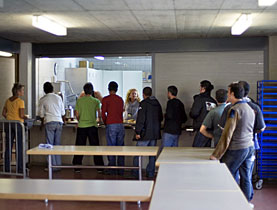
Rejected asylum seekers struggle to survive

Swiss cantons have been criticised for failing to provide for rejected asylum seekers, who are excluded from social welfare but entitled to emergency assistance.
The level of “haphazard” assistance, which varies from canton to canton, is in breach of the constitution in some areas, according to the non-governmental Swiss Refugee Council, which has published a report on the issue.
All rejected asylum seekers in Switzerland lost the right to social welfare payments at the beginning of 2008. However they are entitled to emergency assistance – food and accommodation – from cantonal authorities until they leave the country willingly or are deported.
In a survey of the country’s 26 cantons, the Swiss Refugee Council found that overall emergency assistance is being granted. But there are considerable variations in the amounts paid out and the standard of accommodation provided.
“The emergency assistance is not enough to live on in some cases,” Muriel Trummer, lawyer and author of the Refugee Council report, told swissinfo.
Charities, churches and private networks have to step in to take on what is actually the task of the authorities.
Less than 5 francs
Depending on where they live, rejected asylum seekers are paid from SFr4.25 ($3.82) to SFr11.50 per day. This amount is meant to cover food and toiletries.
Trummer highlighted the situation in Basel, where the accommodation was least satisfactory. Unsuccessful asylum applicants living in the city have to manage without cooking or laundry facilities and are required to carry their belongings around with them all day regardless of the weather.
“It is a matter of basic human dignity to be able to prepare a hot meal for yourself,” she said.
Beat Meiner of the Swiss Refugee Council accused the authorities in the Italian-speaking canton of Ticino of breaching the constitution in their refusal to provide for mentally ill rejected asylum seekers.
Lottery
A ruling by the Federal Court has made it clear that every person has the right to assistance in emergency situations, according to Trummer.
“It confirmed that the right to assistance in emergency situations applies to all persons, to secure their existence and keep them from begging.”
This right cannot be subject to any conditions, such as cooperation with deportation, Trummer said.
The differences between cantons is turning emergency assistance into a lottery, according to the NGO, which is calling for the basic right to emergency assistance to be respected and applied to everyone.
“There is not one human dignity for Africans and another for Swiss people,” Meiner said.
In some areas children of rejected asylum seekers are no longer allowed to attend state schools. In Bern, for example, they are given much fewer hours of classes at the shelter where they live.
Pushed underground
Trummer also points to the fact that it can be problematic when the same authorities that are responsible for deportation are also responsible for emergency assistance. Minimum benefits, the obligation to report and constant checks exert sustained pressure that can drive individuals towards illegal status.
Meiner adds that it is an illusion to think that everyone who has an asylum application rejected will leave Switzerland.
“Our experience shows that people who have gone to the trouble and expense to get to Switzerland will do anything to stay here.”
The Refugee Council argues that these cutbacks in provision for rejected asylum seekers are a false economy.
“When people are put into such a precarious position, it leads to terrible living conditions with consequences such as malnutrition, stress and lack of medical care. These can lead to even higher health costs,” Meiner said.
Complex situation
The cantonal authorities, responsible for the application of asylum laws, say they will examine the NGO study.
“It is very difficult to have an overview of the situation in the cantons,” said Margrith Hanselmann of the Conference of Cantonal Directors for Social Security Matters.
“We do not comment the study at this point, but some differences between cantons could be the result of different calculation methods.”
Hanselmann added that cantons are free to apply recommendations on emergency assistance issued in 2007.
For its part the Federal Migration Office told swissinfo that it was up to the courts to ensure that the emergency provision system conformed to the constitution.
“The federal state does not have the right to instruct or oversee the cantons in this respect,” it said, adding that any change to the status quo would require new legislation.
swissinfo
Rejected asylum seekers are not eligible for regular welfare, but they receive food and accommodation.
The regulation came into effect for all rejected asylum seekers at the beginning of the year, following a nationwide vote in 2006 aimed at challenging a tightening of asylum laws.
The basic emergency assistance differs according to the country’s 26 cantonal authorities which are responsible for the application of the legislation.
About 3,500 rejected asylum seekers in Switzerland benefit from the basic aid, according to cantonal data.
A survey earlier this year showed that an estimated 17,000 rejected asylum seekers lived in Switzerland.
The Swiss Refugee Council says some cantons deny rejected asylum-seekers access to food and accommodation.
There are cases where male and female asylum seekers are housed in the same rooms and without a kitchen or laundry.
The food-and-shelter schemes are not sufficiently adapted to the special needs of families with children, pregnant women, single women, the sick, unaccompanied youths and the disabled.
In some cases the scheme does not cover the basic needs for a dignified human life.

In compliance with the JTI standards
More: SWI swissinfo.ch certified by the Journalism Trust Initiative






























You can find an overview of ongoing debates with our journalists here . Please join us!
If you want to start a conversation about a topic raised in this article or want to report factual errors, email us at english@swissinfo.ch.